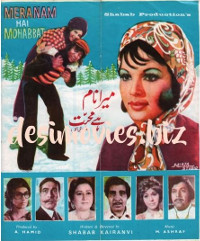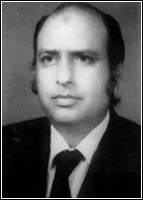| Title | Director | Cast | Genre | Notes |
|---|---|---|---|---|
| Shirin Farhad | Sharif Nayyar | Zeba Ali, Mohammad Ali, Nimmo, Talish | Romance, Drama | The film is a Silver Jubilee |
| Zeenat | S. Suleman | Shabnam, Nadeem, Shahid, Munawar Zarif, Talish | Drama | A Golden Jubilee film and won 5 Nigar Awards |
| Pehchan | Pervaiz Malik | Nadeem, Shabnam, Sabiha Khanam, Qavi Khan | Drama | |
| Sharif Badmash | Iqbal Kashmiri | Yousuf Khan, Aasia, Sultan Rahi, Mustafa Qureshi | Action | Music by Master Abdullah with one mega-hit film song by Noor Jehan |
| Mera Naam Hai Mohabbat | Shabab Keranvi | Babra Sharif, Ghulam Mohiuddin, Zarqa, Bahar Begum, Tamanna, Rehan | Romance | The film was also very successful in China |
| Wehshi Jatt | Hassan Askari | Sultan Rahi, Aasia, Iqbal Hassan, Ghazala, Afzal Ahmed, Ilyas Kashmiri | Action | Music by Safdar Hussain |
| Shararat | S. Suleman | Munawar Zarif, Ghulam Mohiuddin, Mumtaz, Nirala, Khalid Saleem Mota, Lehri | Comedy | It is based on English play Charley's Aunt |
| Sheeda Pastol | Sharif Ali | Munawar Zarif, Aasia, Saiqa, Afzal Ahmed, Aslam Pervaiz, Nayyar Sultana, Sultan Rahi | Social | |
| Jub Jub Phool Khile | Iqbal Akhtar | Zeba, Waheed Murad, Mohammad Ali, Nadeem, Mumtaz | Romance | This was a Golden Jubilee film of 1975 with one super-hit film song sung by Mehdi Hassan with music by M Ashraf. |
| Bin Badal Barsaat | ||||
| Sultana Daku | ||||
| Aik Gunnah Aur Sahi | ||||
| Roshni (film) |

Sheikh Mujibur Rahman, popularly known by the honorific prefix Bangabandhu, was a Bangladeshi politician, revolutionary, statesman, activist and diarist. As a politician, Mujib had held continuous positions either as Bangladesh's president or as its prime minister from April 1971 until his assassination in August 1975. Mujib successfully led the Bangladeshi independence movement and restored Bengali sovereignty after over two centuries following the Battle of Plassey in 1757, for which he is honoured as the 'Father of the Nation' in Bangladesh. In 2011, the fifteenth constitutional amendment in Bangladesh referred to Sheikh Mujib as the Father of the Nation who declared independence; these references were enshrined in the fifth, sixth, and seventh schedules of the constitution. His Bengali nationalist ideology, socio-political theories, and political doctrines are sometimes called Mujibism.

The Sabri Brothers were a musical band from Pakistan who were performers of Sufi qawwali music and were closely connected to the Chishti Order. They are considered one of the greatest Sufi qawwali singers of all times. The Sabri Brothers were led by Ghulam Farid Sabri and his brother Maqbool Ahmed Sabri. They are often referred to as Shahenshah-e-Qawwali and are also known as the roving ambassadors of Pakistan. The band was initially founded by Maqbool Ahmed Sabri at the age of 11 years and was known as Bacha Qawwal Party. His elder brother Ghulam Farid Sabri joined after insistence from their father. He became the leader of the group and the band soon became known as the Sabri Brothers. They were the first-ever qawwali artists to perform qawwali in the United States and other Western countries; they were also the first-ever Asian artists to perform at New York's Carnegie Hall in 1975.

Agha Ali Abbas Qizilbash was a Pakistani actor who made his debut in 1947 and was mostly known and recognized in Pakistan for playing character actor or villain roles. Talish was honoured by a Pride of Performance award, by the Government of Pakistan in 1989.
Sultan Rahi was a Pakistani actor, producer and screenwriter.
Ghulam Mohiuddin ; also spelled Ghulam Mohi-Ud-Din) is a Pakistani actor of Urdu and Punjabi films.

Kamleshwar Prasad Saxena, known mononymously as Kamleshwar, was a 20th-century Indian writer who wrote in Hindi. He also worked as a screenwriter for Indian films and television industry. Among his most well-known works are the films Aandhi, Mausam, Chhoti Si Baat and Rang Birangi. He was awarded the 2003 Sahitya Akademi Award for his Hindi novel Kitne Pakistan, and the Padma Bhushan in 2005.
The following pages for each decade list films produced in Pakistan by year of release.

The Pride of Performance, officially known as Presidential Pride of Performance, is an award bestowed by the Islamic Republic of Pakistan to recognize people with "notable achievements in the field of art, science, literature, sports, and nursing". The Pride of Performance is the highest national literary award of Pakistan conferred upon its citizens and, while it recognizes literary contribution, it can also be conferred upon foreign nationals. It is usually awarded by the president once a year at the Pakistan resolution day, but announcements are made at independence day ceremony held on 14 August. The award recommendations are made by the country's administrative units or respective ministry to the state governments where officials send it to the Cabinet Secretariat and then president or federal government for final approval.
Mirza Nazir Baig, best known by his screen name Nadeem , is a Pakistani actor, singer and producer. He has appeared in over two hundred films during his 56-year-long career.He has also been honored with the Pride of Performance award in 1997. He has also won a record 16 Nigar Awards as an actor.
Shaukat Ali, also known as Shaukat Ali Khan, was a Pakistani folk singer.
Neelo Begum was a Pakistani veteran film actress. She made her film debut in 1956 with Hollywood film Bhowani Junction. She was known as The Queen of Romance and The Princess of Romance for her portrayal of romantic roles. She worked in more than 134 Pakistani films including Urdu and Punjabi language films.
Yousuf Khan (Urdu: یوسف خان; was one of the Pakistan's most respected actors.
Nasreen Rizvi, also known as Kaveeta, is a Pakistani film actress who is known for films Tere Mere Sapne (1975), Society Girl, Mohabbat Aur Mehangai (1976), Kabhi Kabhi (1978), Mutthi Bhar Chawal (1978), Mian Biwi Razi (1982) and Qasam (1993).

Akhlaq Ahmed was a Pakistani film playback singer and still considered one of the leading voices of the film industry.

Safirullah Siddiqui, commonly known by his stage name Lehri, was a Pakistani comedian and an actor in the Urdu film industry of Pakistan.

Mere Naam Hai Mohabaat is a 1975 Pakistani romantic drama film. The film's story is inspired by Love Story (1970), which in turn was based on the novel of the same name by Eric Segal. It won the Nigar Award in 1975 for Best Film of the Year, with additional six awards in different categories. The film was also released in China and became successful there.

Pervez Malik was a Pakistani film director. He was the director of Pakistan's first platinum jubilee film, "Armaan" (1966). He directed more than 20 films, mostly in Urdu language, and received excellent reviews for many of his films from both film critics and the public.
Ali Ejaz was a Pakistani film and television actor known for his film roles in FBI Operation Pakistan (1971), Sona Chandi (1983), and Chor Machaye Shor (1996). He was given the Pride of Performance Award in 1993 by the President of Pakistan.

Ghulam Abbas is a Pakistani radio, television, and film singer. He is known for his ghazals, geets, and playback singing for Urdu and Punjabi movies. Besides winning 4 Nigar Awards as a playback singer, he was also honored with the Tamgha-i-Imtiaz in 2011 and the Pride of Performance Award in 2020 by the President of Pakistan.